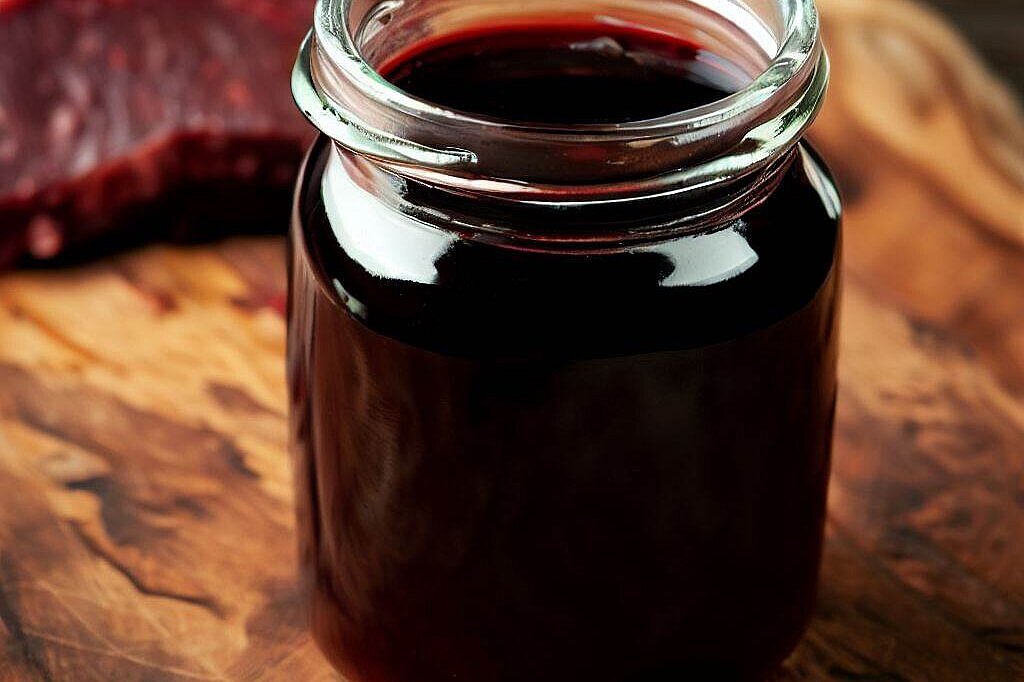Poultry blood

What is poultry blood?
Poultry blood is a by-product of poultry slaughter that is normally disposed of. However, it contains many valuable nutrients that are important for dogs. These include:
- The red blood pigment hemoglobin, which carries iron as its central atom, which transports blood oxygen.
- Proteins, which consist of amino acids that are needed to build up the genetic material in each individual body cell and are necessary for blood and muscle building.
- Minerals such as calcium, phosphorus, sodium, potassium, magnesium, copper, manganese and zinc.
- Vitamins such as vitamin A and B vitamins.
- Trace elements such as iron, copper, zinc, manganese and selenium.
Poultry blood is usually offered dried and powdered to preserve it and make it easier to dose. There are also frozen blood blisters that can be removed individually.
What are the advantages of poultry blood?
Poultry blood has several advantages for dogs that are fed fresh meat (barf):
- It supplements the raw meat, which no longer contains blood, with many vital substances.
- It provides natural iron, which is responsible for the formation of red blood cells and the transportation of oxygen in the blood. Iron deficiency can lead to anemia, which manifests itself in symptoms such as tiredness, weakness, paleness and shortness of breath.
- It promotes muscle growth due to its high protein content. Proteins are the building blocks of muscles and also support regeneration after physical exertion or injury.
- It supports the development of a harmonious body shape during the growth phase. Young dogs need a balanced diet with all the important nutrients to grow and develop healthily.
- It improves the performance and well-being of dogs that are under particular strain (sporting dogs, guard dogs, hunting dogs, breeding dogs) or are in convalescence. These dogs have an increased need for energy and nutrients and benefit from an additional dose of poultry blood.
What are the disadvantages of poultry blood?
Poultry blood also has some disadvantages or risks that you should be aware of:
- It can lead to an overdose of iron or other nutrients if you feed it too often or too much. An overdose of iron can lead to symptoms of poisoning such as vomiting, diarrhea, gastrointestinal bleeding or liver damage. An overdose of other nutrients can lead to metabolic disorders or intolerances.
- An allergic reaction may occur if your dog is sensitized to poultry or one of the ingredients in poultry blood. An allergic reaction can manifest itself through symptoms such as itching, skin rash, swelling or breathing difficulties.
- Contamination or spoilage of poultry blood can occur if it is not processed or stored hygienically. Contamination or spoilage can lead to infection or food poisoning, which can be manifested by symptoms such as vomiting, diarrhea, fever or loss of appetite.
How do you feed poultry blood?
If you want to use poultry blood as a barf ingredient for your dog, there are a few points you should bear in mind:
- Only buy poultry blood from trustworthy producers or retailers who guarantee high quality and freshness. Pay attention to the best-before date and storage conditions.
- Dose poultry blood according to your dog's body weight and the composition of its barf meal. The recommended amount is 0.3 g per kg body weight per day (maximum 12 g per day). Do not exceed this amount to avoid overdosing.
- Mix poultry blood into your dog's raw meat or vegetables. You can also mix it with a little water and drizzle it over the food.
- Feed poultry blood regularly, but not daily. For example, you can give it two to three times a week. You can also vary the source of the blood by alternating between cattle blood and pig blood if your dog can tolerate it.
- Monitor your dog after feeding poultry blood for possible side effects such as intolerances, allergies or poisoning. If you notice such symptoms, stop feeding poultry blood immediately.
Poultry blood is a nutrient-rich barf ingredient for dogs that has many benefits for the health and well-being of your four-legged friend. It is particularly suitable for allergic animals that cannot tolerate bovine blood. However, you should make sure to feed poultry blood in the right quantity and quality and monitor your dog for any potential disadvantages or risks. By following these tips, you can provide your dog with a varied and species-appropriate diet.
If you notice any signs of hypersensitivity or poisoning in your dog, you should see your vet immediately. We are not a substitute for a vet, but we try to be as accurate as possible. Every dog reacts differently and we recommend you get a second opinion or consult your vet if in doubt.
Stay healthy and take good care of your four-legged friend!😊
Similar to Poultry blood
Bovine blood is the blood of cattle that is drained during slaughter. It contains many nutrients such as protein, iron, vitamin B12 and other minerals. Bovine blood is often dried or processed into...
Pig blood is the blood of pigs that is drained during slaughter. It contains various components such as red blood cells, white blood cells, platelets and plasma. Pig blood is rich in proteins,...
Lamb's blood is the blood of slaughtered lambs, i.e. young sheep. It is usually sold frozen in bags or cans and can be used as a supplement to barf feed. Lamb blood has a very high iron content and...
Goat blood is the blood of slaughtered goats, usually from regional and species-appropriate husbandry. The blood is supplied frozen in bottles or bags and can be portioned and refrozen as required...
